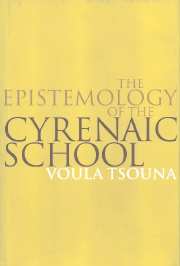Book contents
- Frontmatter
- Contents
- Preface
- Abbreviations
- 1 Knowledge and the good life: the ethical motivation of the Cyrenaic views on knowledge
- PART I SUBJECTIVISM
- PART II SCEPTICISM
- PART III SUBJECTIVISM, EMPIRICISM, RELATIVISM: CYRENAICS, EPICUREANS, PROTAGOREANS
- 9 Cyrenaic subjectivism and the Epicurean doctrine that all perceptions are true: Plutarch, Adv.Col. 1120f–1121e
- 10 Cyrenaic epistemology and Protagorean relativism: some considerations
- 11 The Socratic connection
- Appendix: Sources and testimonies
- References
- Index of names
- Index locorum
- Subject index
11 - The Socratic connection
Published online by Cambridge University Press: 22 September 2009
- Frontmatter
- Contents
- Preface
- Abbreviations
- 1 Knowledge and the good life: the ethical motivation of the Cyrenaic views on knowledge
- PART I SUBJECTIVISM
- PART II SCEPTICISM
- PART III SUBJECTIVISM, EMPIRICISM, RELATIVISM: CYRENAICS, EPICUREANS, PROTAGOREANS
- 9 Cyrenaic subjectivism and the Epicurean doctrine that all perceptions are true: Plutarch, Adv.Col. 1120f–1121e
- 10 Cyrenaic epistemology and Protagorean relativism: some considerations
- 11 The Socratic connection
- Appendix: Sources and testimonies
- References
- Index of names
- Index locorum
- Subject index
Summary
In the introductory chapter (chapter 1), I maintained that the Cyrenaics consider the exploration of epistemological issues instrumental to their hedonism and that this is partly dictated by their understanding of the Socratic project. They follow the model of Socrates (Cicero, Tusc. v.10–11) in that they consider ethics the only study worth pursuing, and commend other intellectual endeavours only in so far as these may help us lead the good life. Further, they espouse the Socratic idea that we should ground our choices on knowledge, limited as that may be, not on belief and conjecture. In the close of this study, I wish to take up a little further the topic of the Socratic identity of the school by asking a question which has less to do with the overall ethical project of the Cyrenaics and more with the character of Cyrenaic epistemology itself. Is there anything recognisably Socratic about it?
Historically, the preface to Sextus' presentation of the Cyrenaic doctrine in Mvii.191–200 may indicate that in antiquity the doctrine was taken to have a Socratic affiliation: ‘But now that an account of the Academic doctrine from Plato onwards has been rendered above, it is not perhaps out of place to go over the position of the Cyrenaics. It seems that the school of these men has sprung from the philosophy of Socrates, from which also emerged the succession of Plato's school’ (190 [T6b]).
- Type
- Chapter
- Information
- The Epistemology of the Cyrenaic School , pp. 138 - 142Publisher: Cambridge University PressPrint publication year: 1998



